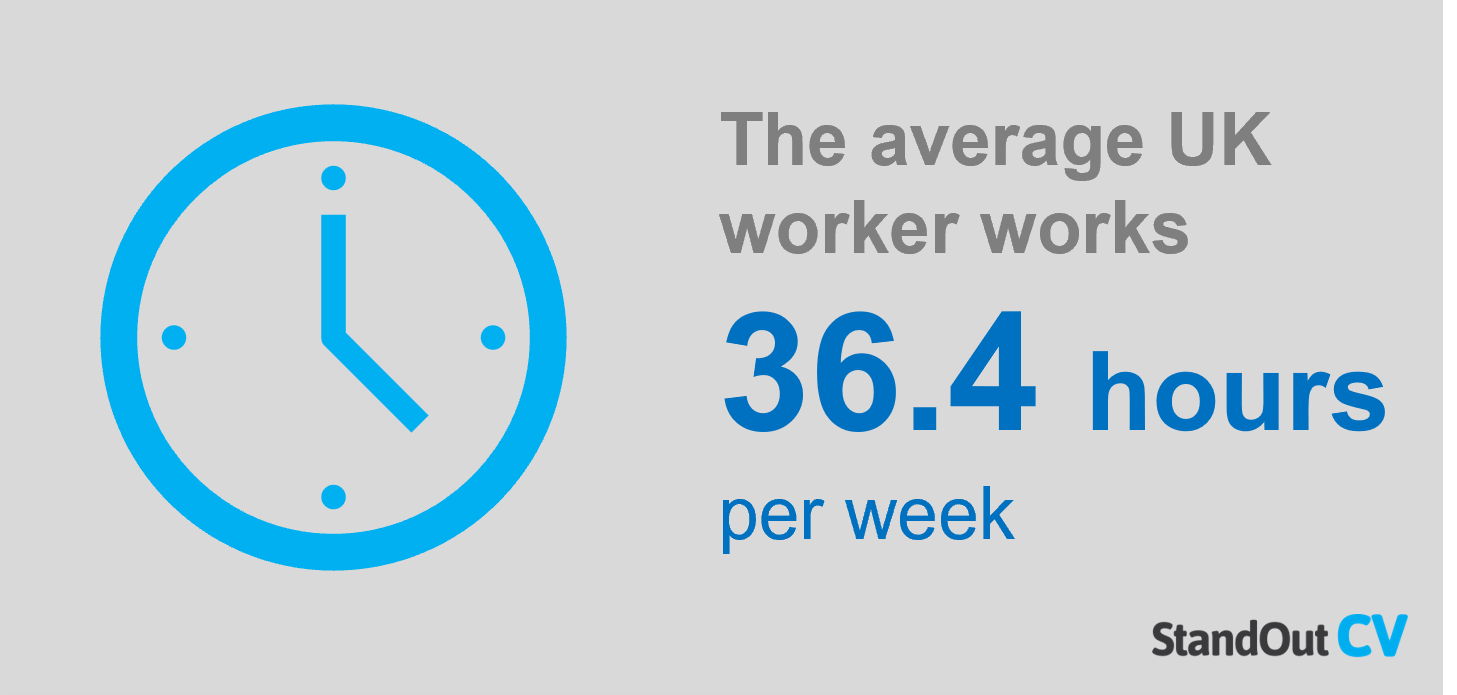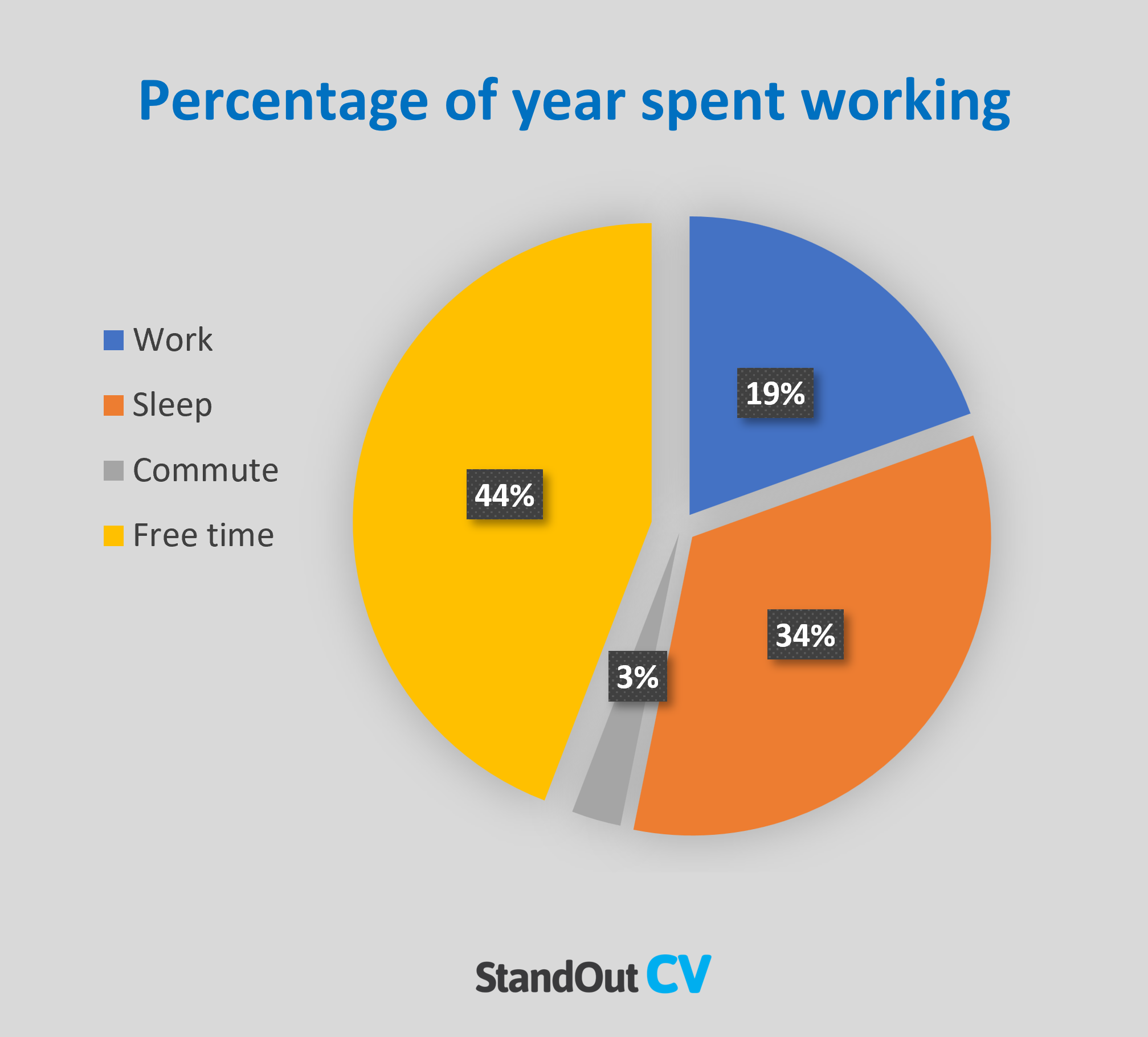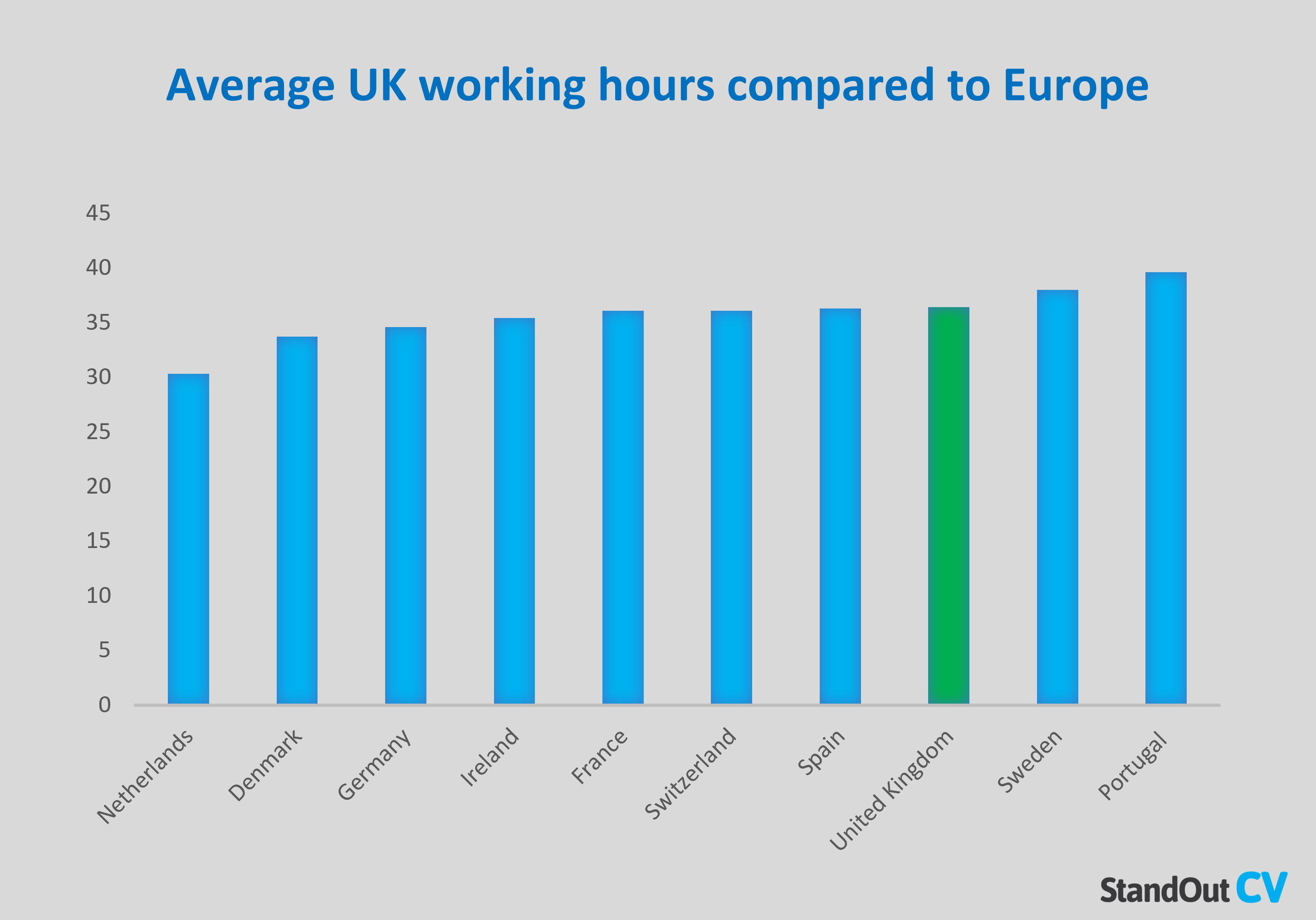Work takes up a significant portion of our time in the UK.
But exactly how many hours are we working every week? Who is working the longest hours? And how do our hours stack up against other countries?
We’ve compiled a plethora of data from the ONS, OECD and numerous other sources to bring you all the latest information on working hours in the UK and beyond.
Contents
Key working hours statistics
- The average British worker works 36.4 hours per week.
- UK workers spend 19% of every year working.
- British workers work some of the longest hours in Europe – 6.1 hours per week longer than the Netherlands, but 3.2 hours less than Portuguese workers.
- UK staff work an average of 2.4 hours less per week than workers in the USA.
- Men work an average of 3.7 hours per week longer than women.
- CEOs work an average of 62.5 hours per week and nurses work an average of 37.5 hours per week.
Average working hours per week UK
The average full-time working person in the UK works 36.4 hours per week. This is based on the most recent ONS data (Q4 2022).
Average working hours per day
Based on a 5 day working week, the average British full-time employee works 7.28 hours per day.
What percentage of our year is spent at work?
If the average Brit is working 36.4 hours per week and is receiving (and taking) the minimum paid holiday allowance of 5.6 weeks, they will spend 19% of their year working (1,688.96hrs).
Assuming that everybody sleeps for the recommended 8 hours per night and taking commuting times into account, this leaves 44% of the year left as free time.
How much unpaid overtime do British workers do?
Although the average working hours from the ONS provide the best available data on average working hours, they only take into account contracted and paid working hours.
This leaves a significant but largely unreported portion of work in the UK; unpaid overtime.
According to analysis by the TUC of data from the Labour Force Survey found that over 3 million people worked 7.7 hours of unpaid overtime per week in 2020, each losing out on an average of £7,300 per annum.
If the average British worker added this amount of overtime to their normal hours, their average working hours would rise to 44.1 hours per week, an increase of 21%
UK work break requirements
To ensure that British workers receive adequate rest during and between working periods, the UK government entitle every worker to 3 types of break: rest breaks, daily rest and weekly rest.
- Rest breaks at work: Workers have the right to one 20 minute uninterrupted rest break during every working day.
- Daily rest: Workers have the right to 11 hours rest between every working shift. For example if they finish work at 6pm they should not start work until at least 5am.
- Weekly rest: Workers can choose between the right to an uninterrupted 24 hour period without work every week, or an uninterrupted 48 hour period without work every fortnight.
Maximum UK shift length allowance
The Working Times Regulations state that no single work shift should be longer than 13 hours.
Do men work more hours than women?
According to a Towards Data Science report, men work more hours than women. They found that men work an average of 41.0 hours per week, and women work an average of 36.3 hours per week.
Average UK working hours during the pandemic
The Covid-19 pandemic had a huge effect on working hours across the UK, with many people having to work from home, and whole industries shutting down causing many people not being able to work at all.
During the height of the pandemic in 2020 the average UK weekly working hours dropped to 33.6 hours – a 2.8 hour reduction from the current figure.
Average part-time working hours per week UK
Of course, not everybody in the UK works full-time. Part-time workers make up around 35% of Britain’s workforce and they work an average of 16.7 hours per week.
Average UK working hours over the past 30 years
According to the ONS, from 1992 to 2022 the average working hours have reduced by 1.7 hours, from 38.1 hours to 36.4 hours.
Whilst there has been a steady reduction of working hours over the years, the current figure may still be affected by the drop in working hours caused by the pandemic.
Which industries work the most hours?
The ONS working hours data shows us that people in Agriculture, forestry and fishing work the longest hours of all people in the UK with each person working an average of 40.4 hours per week (11% longer than the UK average).
Those in the Education sector and Accommodation & food services work the shortest hours, working 25.9 and 25.2 hours per week respectively, around 30% less than the UK average.
| Industry | Hours worked per week |
|---|---|
| Agriculture, forestry & fishing | 40.4 |
| Construction | 34.8 |
| Manufacturing | 34.7 |
| Transport & storage | 34.5 |
| Information & communication | 34.4 |
| Mining, energy & water supply | 34.0 |
| Financial, insurance & real estate | 33.3 |
| Public admin & defence; social security | 32.2 |
| Professional, scientific & technical | 32.1 |
| Wholesale, retail & repair of motor vehicles | 30.0 |
| Administrative & support services | 29.7 |
| Human health & social work | 29.2 |
| Education | 26.9 |
| Accommodation & food services | 25.2 |
How many hours do CEOs work?
With an average salary of £85,239, CEOs have been in the top 5 highest paid jobs in the UK for many years. But do these mega salaries come at a personal cost?
The Sydney Morning Herald carried out a study on 27 CEOs working for global companies and fond that the average CEO works 62.5 hours per week – that is almost double the UK average.
This includes 45 hours per week in meetings, 3.9 hours of work at weekends and 2.4 hours of work on holidays.
How many hours do nurses work?
Nurse’s salaries have been under much scrutiny in the media recently with many people feeling that many nurses are not being paid enough. Despite an average NHS nurse salary being relatively low, they work an average of 37.5 hours per week – 1.1 hours longer than the average British worker.
Average UK working hours compared to Europe
According to the most recently released data from the Organisation for Economic Cooperation and Development (OECD) British employees work some of the longest hours in Europe. Our Portuguese counterparts work an extra 3.2 hours per week than us, but in the Netherlands the average person only works 30.3 hours per week.
| Country | Average weekly hours |
|---|---|
| Netherlands | 30.3 |
| Denmark | 33.7 |
| Germany | 34.6 |
| Ireland | 35.4 |
| France | 36.1 |
| Switzerland | 36.1 |
| Spain | 36.3 |
| United Kingdom | 36.4 |
| Sweden | 38 |
| Portugal | 39.6 |
Average UK working hours compared to USA
The average American worker clocks in 38.8 hours of work per week compared to Britain’s 36.4, meaning that Brits work 2.4 hours less per week than those in the USA.
Maximum working hours in the UK
The working time regulations set out by the UK government dictate that no employee should ever work more than 48 hours per week, on average over a period of 17 weeks. However, individuals can choose to opt out of the 48-hour work week.
Some jobs and industries are exempt from the 48 hour work week, such as military personnel, emergency services, or workplaces where 24-hour staffing is required.
People under the age of 18 years cannot work more than 8 hours per day or 40 hours per week.
Sources
All of the data from this report was taken from the sources below, which include a mixture of government organisations and well-known publications.
Office for National Statistics – Average actual weekly hours of work for full-time workers (seasonally adjusted) : https://www.ons.gov.uk/employmentandlabourmarket/peopleinwork/earningsandworkinghours/timeseries/ybuy/lms
CEIC – United Kingdom UK: Part Time Employment: % of Total Employment: https://www.ceicdata.com/en/united-kingdom/employment-and-unemployment/uk-part-time-employment–of-total-employment
Office for National Statistics – Average actual weekly hours of work for part-time workers (seasonally adjusted): https://www.ons.gov.uk/employmentandlabourmarket/peopleinwork/earningsandworkinghours/timeseries/ybvb
UK Government – Holiday entitlement: https://www.gov.uk/holiday-entitlement-rights
People Management – UK employees worked £24bn worth of unpaid overtime last year, research suggests: https://www.peoplemanagement.co.uk/article/1742980/uk-employees-worked-24bn-worth-unpaid-overtime-last-year-research-suggests
Towards Data Science – Is the Difference in Work Hours the Real Reason for the Gender Wage Gap?: https://towardsdatascience.com/is-the-difference-in-work-hours-the-real-reason-for-the-gender-wage-gap-interactive-infographic-6051dff3a041
The Sydney Morning Herald – Forty-five hours a week in meetings: Who wants to be a CEO?: https://www.smh.com.au/business/workplace/forty-five-hours-a-week-in-meetings-who-wants-to-be-a-ceo-20180627-p4zny8.html
Organisation for Economic Cooperation and Development – Average usual weekly hours worked on the main job: https://stats.oecd.org/Index.aspx?DataSetCode=AVE_HRS
UK Government – Maximum weekly working hours: https://www.gov.uk/maximum-weekly-working-hours
UK Government – Rest Breaks at Work: https://www.gov.uk/rest-breaks-work
Trades Union Congress – What are the maximum hours I can be expected to work over an average working day?: https://www.tuc.org.uk/guidance/what-are-maximum-hours-i-can-be-expected-work-over-average-working-day
Learn Direct – How many hours do Nurses work?: https://www.learndirect.com/blog/how-many-hours-do-nurses-wor
Further help: CV examples – CV advice – Job search statistics





